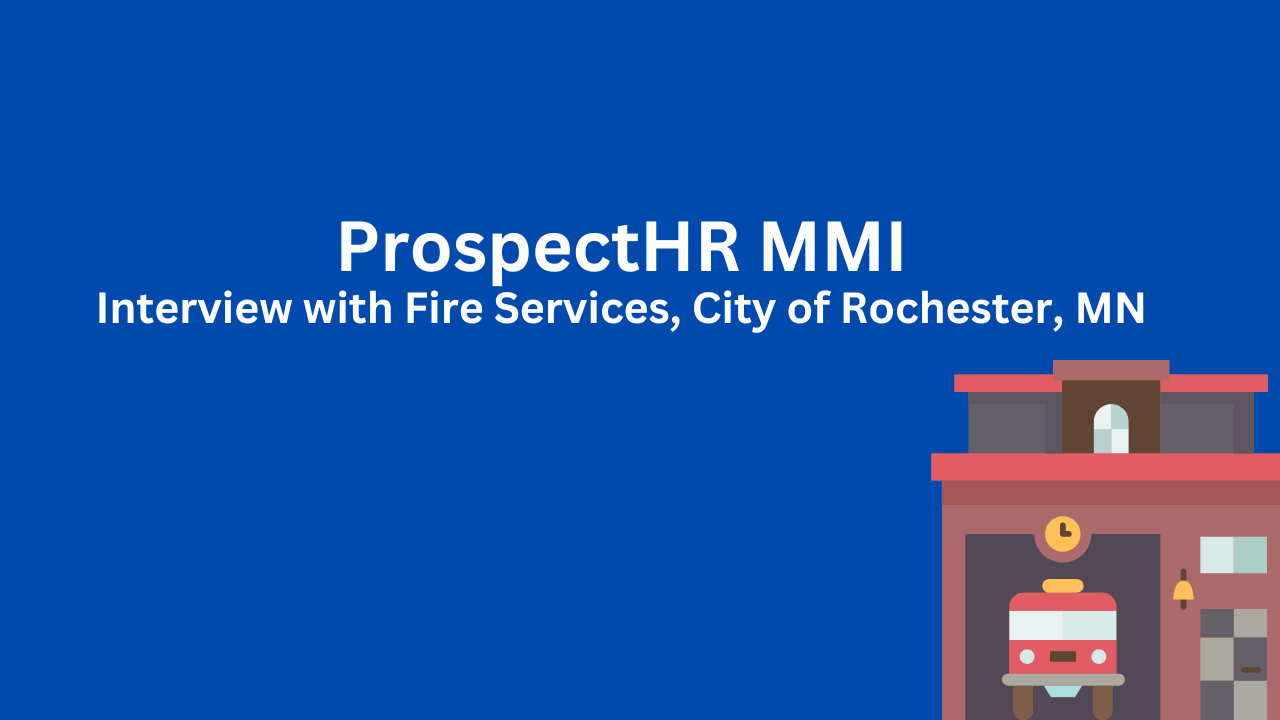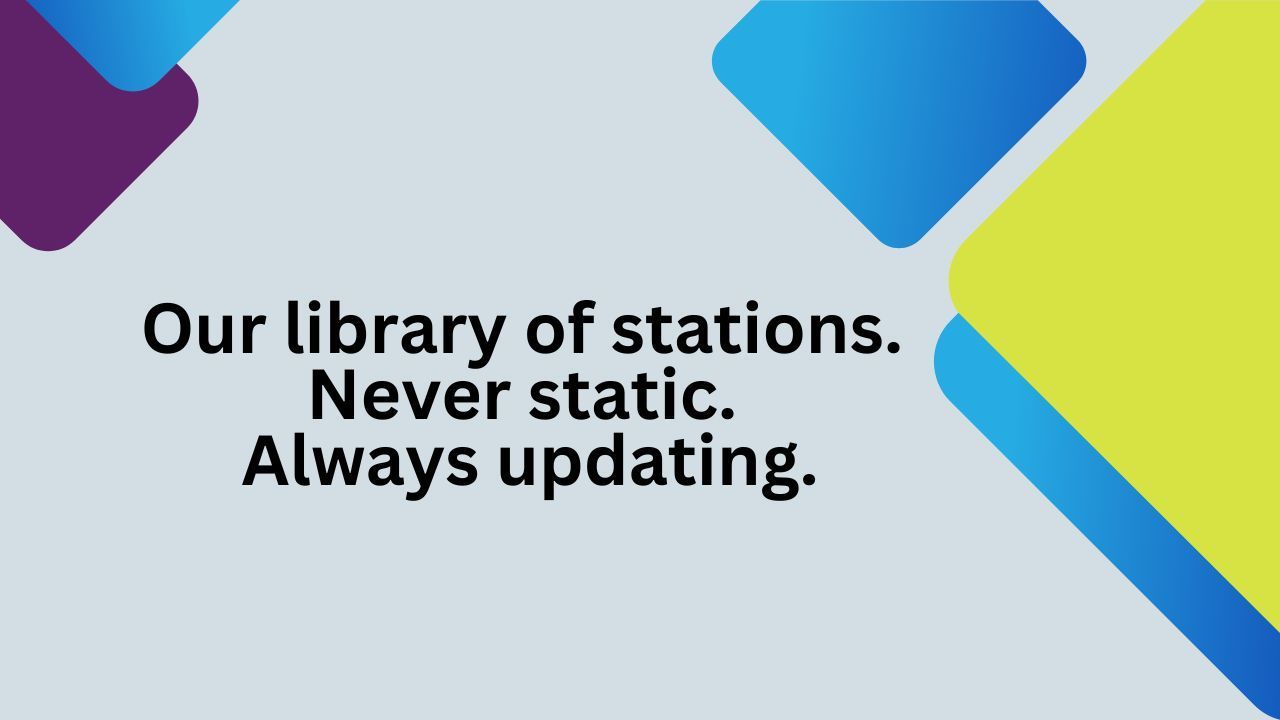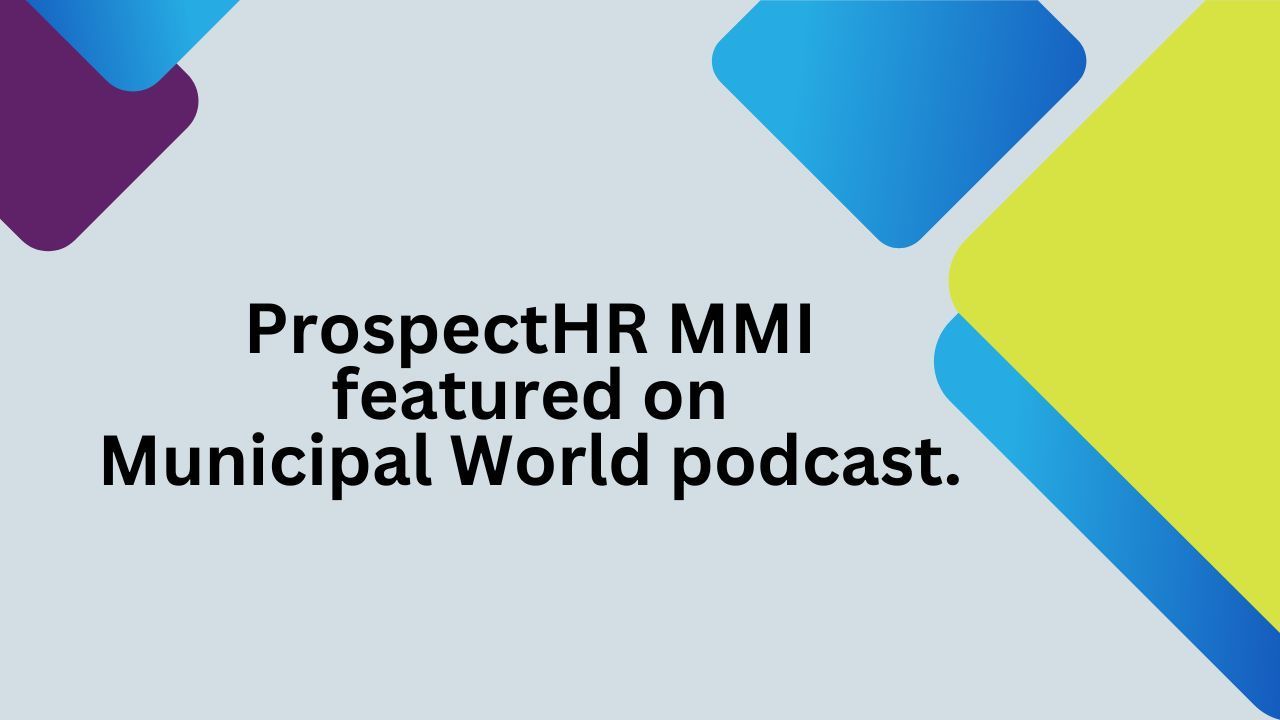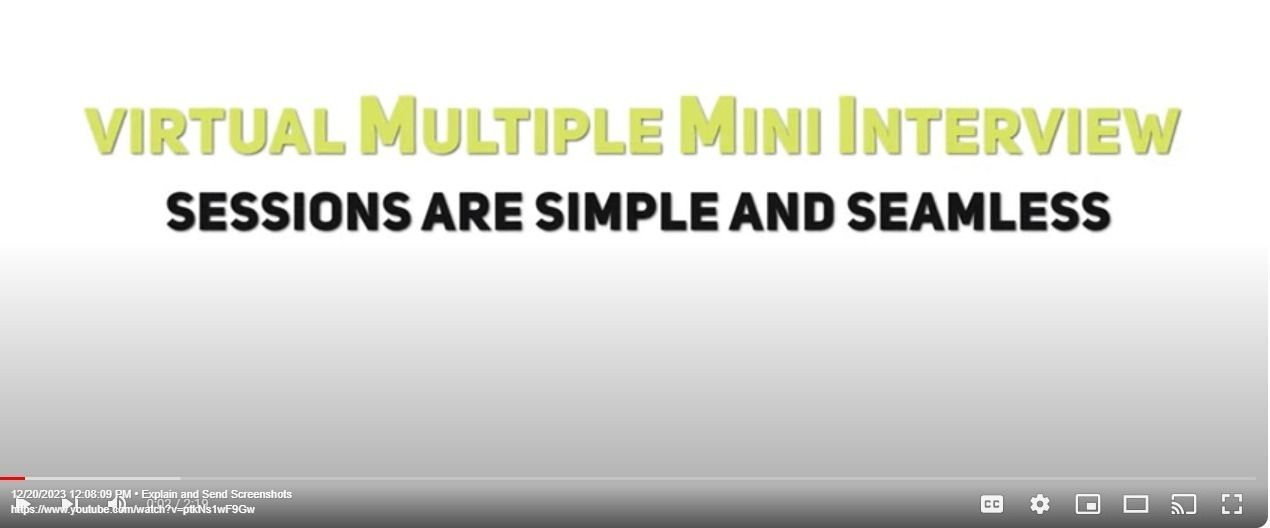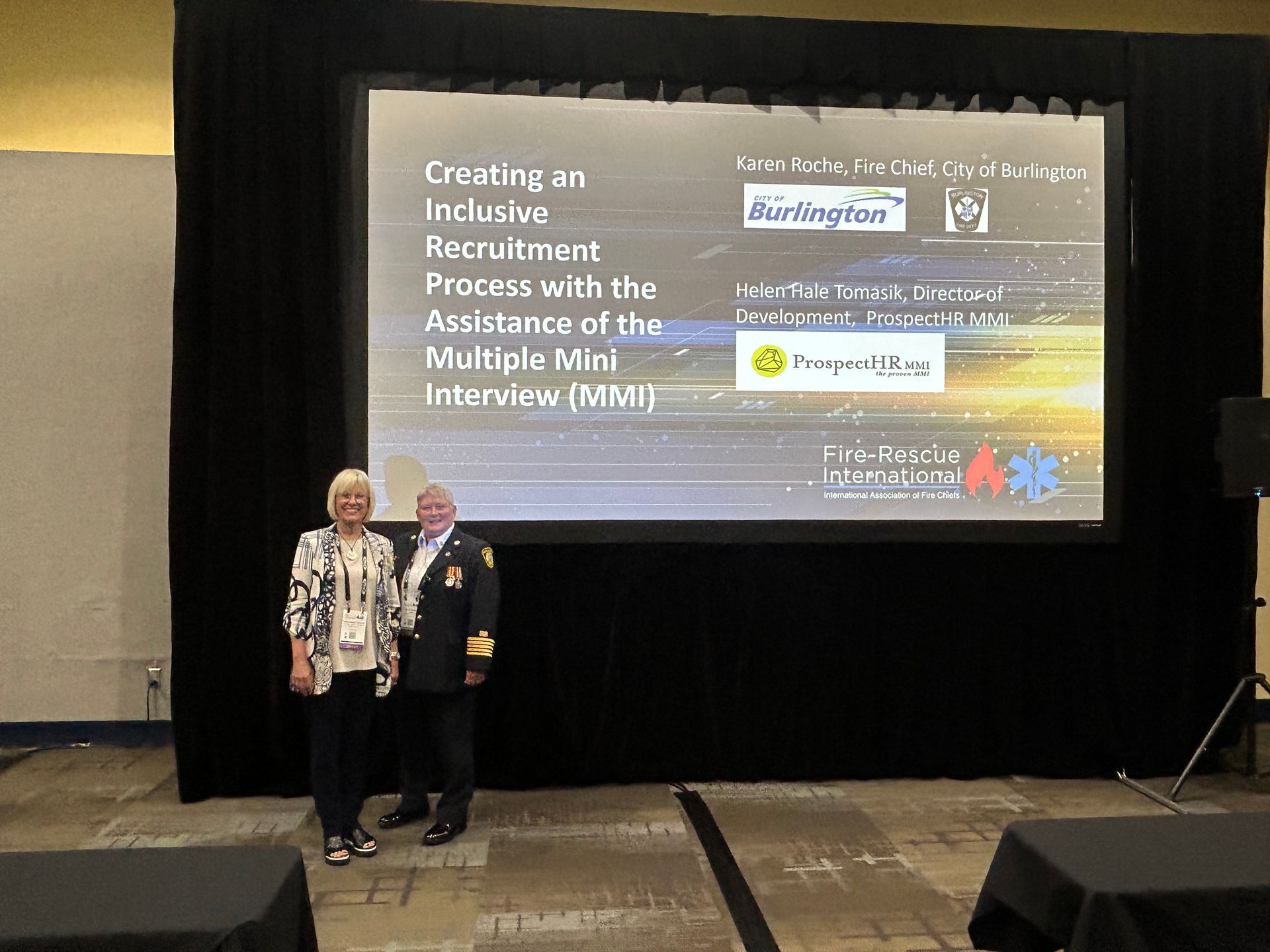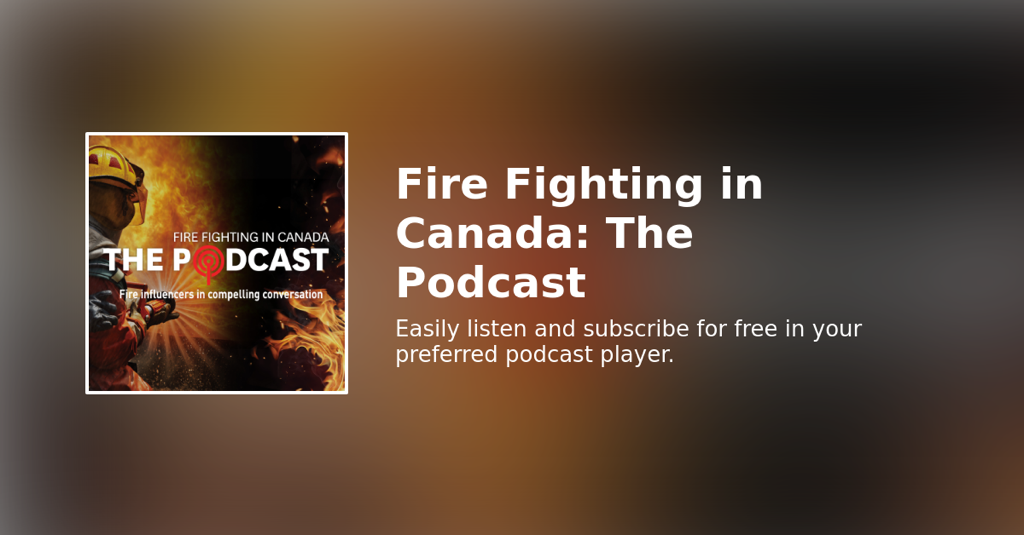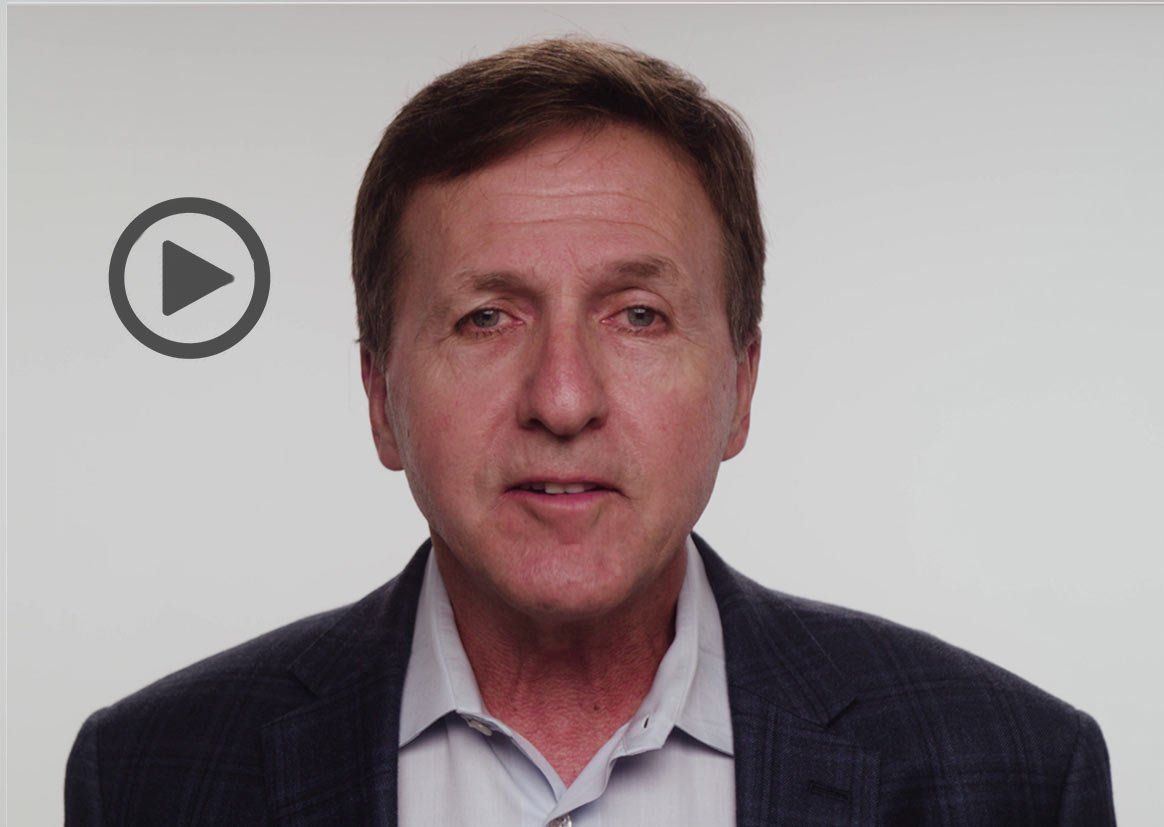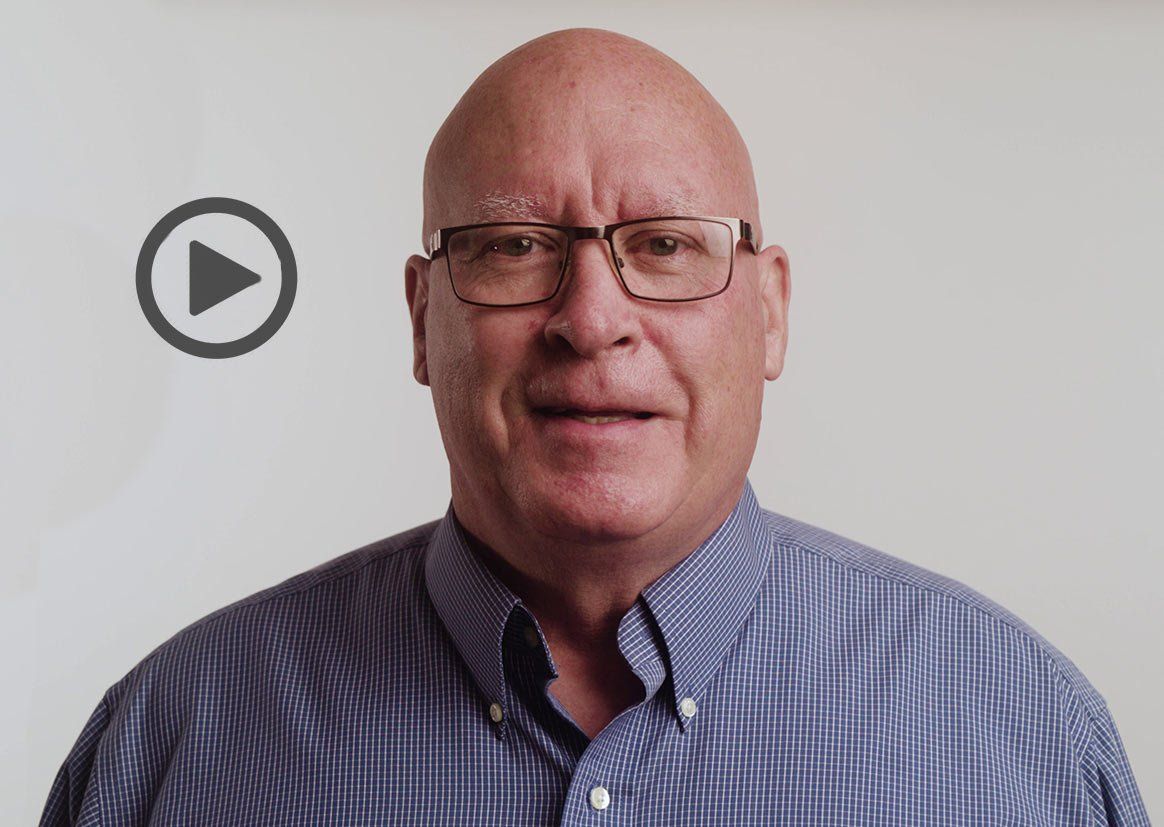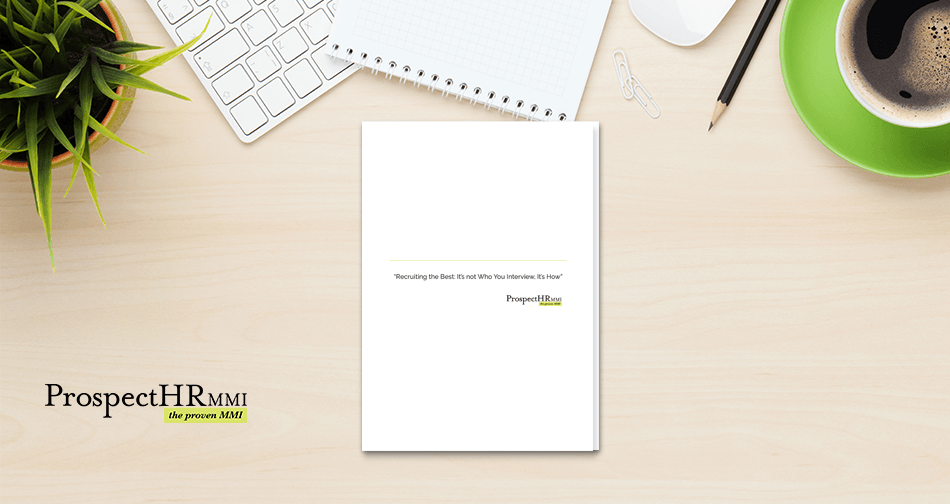Trends & Insights

The history of the ProspectHR MMI. A Board member’s insight. When speaking of the history of our Multiple Mini Interview (MMI), personal insights and reflections are an important part of the story. In this article we spoke to Paul Grunthal, MSc and ProspectHR MMI Board Advisor. Paul, when and how did you first hear of an MMI? I was introduced to the MMI in the fall of 2006 when I moved to the tech transfer office from the Faculty of Science at McMaster University. The MMI was one of the first McMaster technologies I helped bring to market and I have been working with the team ever since. Why was the MMI important to pursue from a large scale POV and why was it important to you personally? I gravitated towards the MMI because I saw it had great potential. Before being introduced to the interview system, I was a career coach to Science students in co-operative education at McMaster. We taught courses on how to be interviewed and ran mock interviews. It was this experience that helped me appreciate how the MMI could simultaneously to: 1. Minimize interviewer bias 2. Help select better candidates 3. Give applicants the ability to overcome or recover from the pressure of an in-person interview. To me it seemed like a 'win-win-win' scenario. When did the idea of forming a company emerge? How did ProspectHR MMI come about? Initially the MMI was less than 100 scenarios on a CD and we had two clients. When we compiled a more formal product package and the developers became more active in research papers and conference appearances we were barely able to keep up with the number of licenses we needed to draft. It was when we hit about 12 or 13 customers that we thought this could really be something bigger. In 2008, with two of the inventors present, APT INC was launched as the exclusive global retailer of McMaster's Multiple Mini-interview. Was there a time when you thought, "this is going to work!". Please share that experience. When APT launched the online portal version of the MMI in 2011 I knew this business was truly scalable and that we could reach customers around the world. Previously, I was manually sending out updates by mail. With more and more clients coming onboard this was becoming a very onerous task that needed to be streamlined and automated. From those early days, we now have clients on five continents that can access the latest MMI content 24/7. What was your motivation for staying involved with the MMI and ultimately, ProspectHR MMI? I believed in the concept and I felt attached to the MMI. It was a winner that was going to make a difference in people's lives and careers. I had been an interviewer, a station writer, a content creator, and commercial advocate. The more I worked with the MMI the more I appreciated its elegant solution to candidate selection and to date I've seen nothing else that would change my mind.
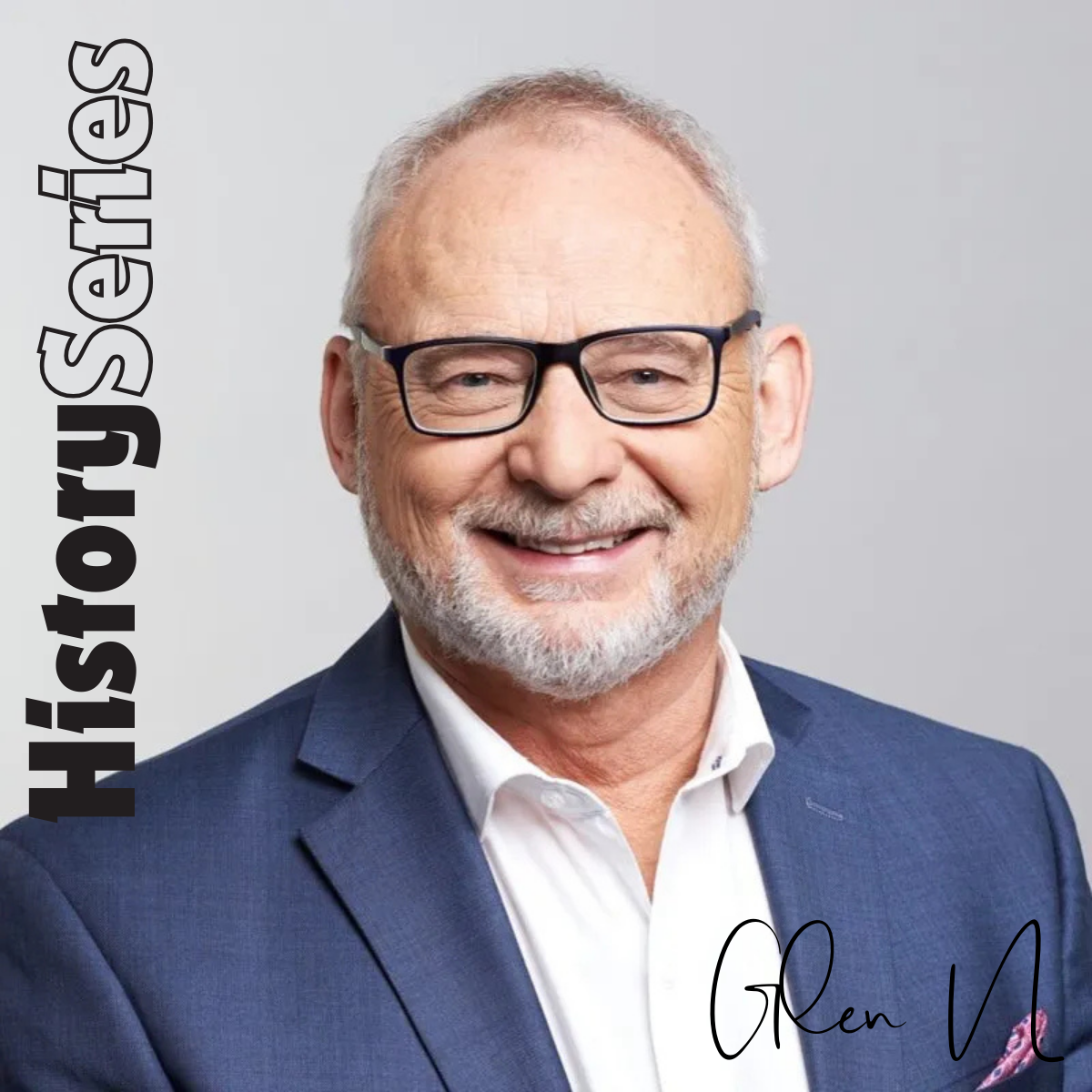
Each month we get in touch with one of our Board members to discuss their personal history with the MMI and ProspectHR. This month we had a conversation with Glen Norton, CPA, CMA, MBA and Chairman of the Board. Glen, when and how did you first hear of an MMI? What year was that and where were you working? In 2007, after many years in the commercial banking sector, I launched my own management consulting business. During this time, I was approached by the Director of the McMaster Industry Liaison Office and hired to conduct a commercialization feasibility study on a method developed by the Medical School at McMaster University. This method, known as the Multiple Mini Interview (MMI) was designed to assess candidates for admission into the university’s prestigious medical program. My research, which included focus groups with universities, government agencies, and private corporations, confirmed that the MMI was both unique and highly marketable. As a result, I was invited to co-found a company to bring the technology to the global market. What did you think about the idea of an MMI when it was first explained to you? I was intrigued with the idea, but was skeptical because it was not like anything I had ever encountered in my own career. Why was the MMI important to pursue from a large scale POV and why was it important to you personally? One of the key reasons I believed it was important to bring this new technology to the world was its potential to improve recruitment decisions, resulting in stronger graduates and more effective hiring in private companies. As a former banker, I also saw the significant cost-saving benefits it could offer to clients, which further reinforced its value. What were you hoping to change when you were part of creating the MMI? I was hoping that the MMI was a way to provide some objective basis for recruitment/hiring which is usually a very subjective decision. And it was. What problem did the creation and growth of the MMI solve? The MMI helps reduce the number of bad hires (and poor admissions). This is good for the organizations AND the individual. When did the idea of forming a company emerge? How did ProspectHR MMI come about? As soon as I submitted my favorable commercialization report I was asked to assist in the formation of the company and to take an ownership stake, along with two of the co-creators and the McMaster Industry Liaison Office. Was there a time when you thought, "this is going to work!"... Please share that experience. Due to the fairly exhaustive commercialization study, I was convinced it would work before we even had our first customer. It helped of course that several other Canadian medical schools were already doing their own research and were duplicating the McMaster University results. W hat are some of the most exciting moments in the development/growth of the MMI for you? One of the most exciting moments was when we were asked to set up a pilot program for the government of one of the former Soviet Union countries. We had to send several people overseas to demonstrate and have numerous stations translated into Russian. That country ultimately decided not to go with our solution but it was an exciting time and opened our eyes to the potential of the international market. What was your motivation for staying involved with the MMI and ultimately, ProspectHR MMI? I have remained actively involved with the company as both Board Chair and CFO, driven by my passion for entrepreneurship and my continued belief in our product. I enjoy contributing new ideas, especially for stations tailored to the government and corporate sectors. Our database has now expanded to include over 700 interview stations. Were there any obstacles in the development and growth of the MMI that really stand out to you? Obstacles that needed to be hurdled to move forward? The biggest obstacle to growth has been convincing university admission offices and corporate HR departments that the way they have recruited or assessed candidates in the past is not the best way to identify and test for essential soft skills.
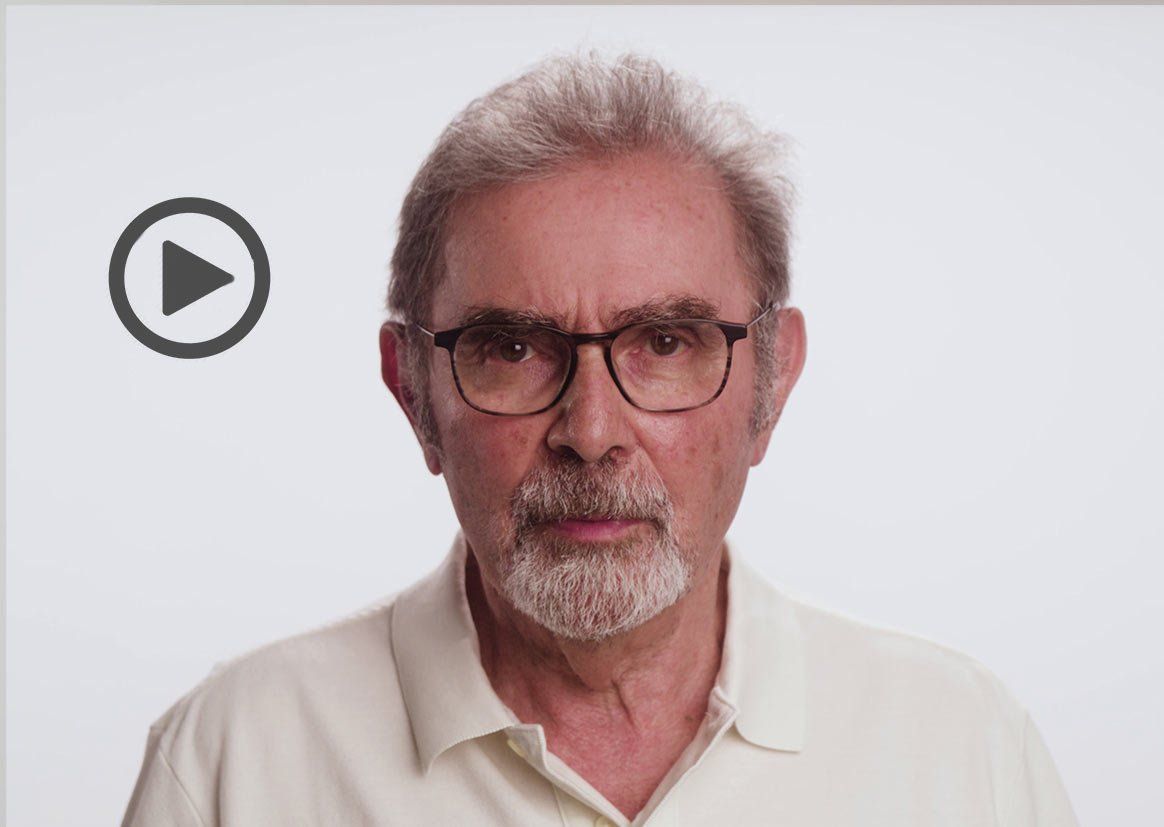
When asked when he discovered the MMI, Jack Rosenfeld, PhD, Co-Founder and Chief Operations Officer replied, “I didn’t hear about the MMI, I was one of the co- creators!” That response deserved more than a passing sentence in an article about the History of the MMI. Below is the personal memory and insight of Jack Rosenfeld, one of the founding fathers of the MMI we know and trust today. Jack: “In the late 1990s, McMaster University graduates were performing poorly on the medical licensing exam. At the time selection was by a 3 person panel interview and our students were not performing well.The admission committee, wanting to solve the problem, asked the evaluation committee on which I served to look into the situation and offer solutions. At this point in my career I was running the OSCE. OSCE stands for “Observed Structured Clinical Examination.” OSCEs are very helpful in medical education because they allow a student to practice and demonstrate clinical skills in a standardized medical scenario. ‘ The OSCE has the same structure as the MMI but the stations are medical. At a meeting of the evaluation committee it was suggested that we consider using the OSCE for admission. The idea was originally dismissed on the basis of cost and at the time, dropped. During this time I was still thinking about how the OSCE could be used for admission. The timing couldn’t have been better. The weekend of evaluations was fast approaching. I took the time to calculate the time and cost factor of using the OSCE structure and came to the conclusion that the cost was in favour of the MMI and I sent my analysis to the committee for review. The chair of that committee, Professor Geoff Norman responded “By crikey, I like it” and the MMI was on its way. The concept and idea gained traction quickly. The Evaluation Committee had the expertise to ensure the scientific and scholarship criteria were met at the highest standards. The necessary University committees made it a priority and gave us freedom to plan and run trials. These succeeded because there was a first class team that ran the OSCE’s for many years. That made getting the first studies up and running streamlined, in this case just a single phone call got the planning and logistics rolling ” Thank you to Jack for sharing his memories and insights into the beginnings of the MMI. To find out more about the history of the MMI visit: https://www.prospecthrmmi.com/the-story-behind-prospecthr-mmi
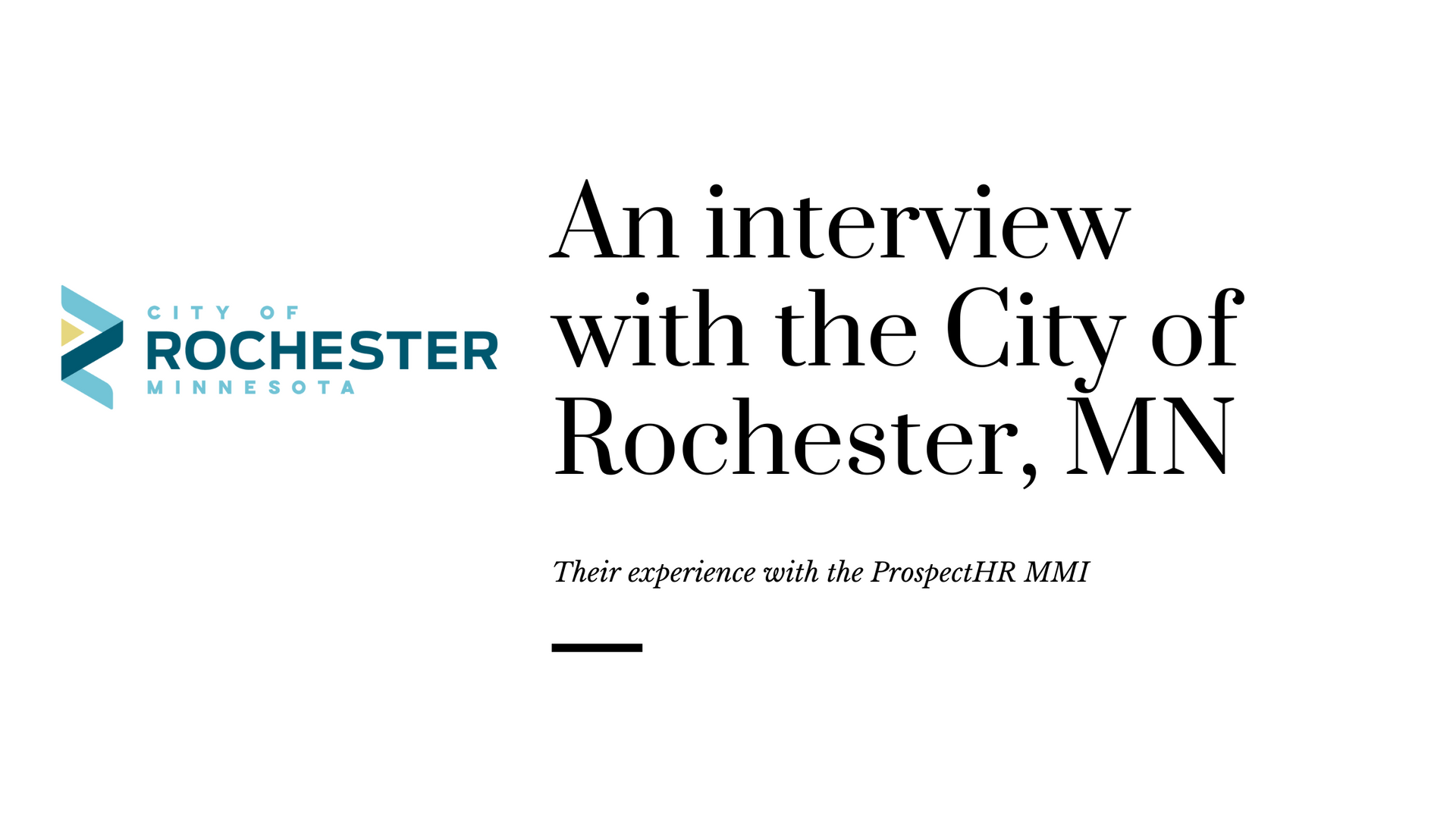
Bad hires. These are two words that HR managers and stakeholders in the recruitment process in any company fear. But in a municipal Fire Services setting, those two words are particularly troublesome. A Fire Services hire is with the service for an average of 25 -30 years. A good hire becomes a long term, valuable asset while a poor one becomes a financial and administrative deficit that can last decades. Studies have proven that one way to help ensure recruits have the right skills for the right job is to purposefully recruit for soft skills. And more specifically, the soft, or people skills, required for the unique task that person is being hired for. At ProspectHR MMI we’ve developed the only proven Multiple Mini Interview (MMI). Over the past 25 years, it has been extensively tested, evolved and improved so it is now the definitive MMI for identifying soft skills in the recruitment process of medical, municipal and educational institutes. Recently the City of Rochester, MN Fire Services included our MMI in their early recruitment stage for the first time. We caught up to Caleb Feine, the Assistant Fire Chief for the City of Rochester, MN and their HR Business Partner, Kari Berns and asked them a series of questions to give readers a glimpse into their experience with the MMI, the challenges they were hoping to overcome and the outcome. Interviewer: Recruitment for fire services hasn’t changed much in decades. I’m sure this is true in the City of Rochester. What challenges were you facing that spurred the idea of changing your recruitment process? Caleb: Fire Service jobs in the City of Rochester are highly attractive and each year we are happy to get up to 200 applicants. Our first challenge is to shorten that long list of initial applicants into a smaller Eligibility Roster. Interviewer: How do you shorten that list? Caleb: In the past we’ve done two things to determine who will be placed on the Eligibility Roster: ● A Phone Screening ● A PEP test Kari: The Phone Screening took several days and many employee hours to complete. For instance, it took 3 weeks and 2 people to screen 80 candidates, plus time to coordinate with candidates to complete the PEP test and review those findings. It was a lot of work. Caleb: And most importantly, we didn’t feel that the Phone Screening process was as equitable as it could be. We wanted a process where each individual who wanted an opportunity to get in front of us, could. I’m a believer that the best way to get to know a candidate is to get them in front of a real person. This gives everyone the best opportunity to show their best selves. Kari: That’s where the idea of working with ProspectHR MMI came in. Interviewer: Where were you first introduced to ProspectHR MMI? Kari: It was at the Annual Fire and Rescue International Conference in Kansas City last year. One of our Deputy Chiefs was at a session where the Fire Chief from Burlington, Ontario was discussing her experience exploring and implementing alternative methods for recruitment. And from what I heard, it sounded like this could be a good fit to meet our goal of getting people in front of us in a manageable way. Interviewer: Okay, so you’re curious about ProspectHR MMI, thinking it might be an answer to the challenge of replacing the Phone Screening and PEP test in your initial recruiting process. What happened next? Caleb: We connected with Helen Hale Tomasik at ProspectHR MMI and she walked us through the process. Interviewer: And how was that? Caleb: Helen was our key contact and she was incredibly helpful and responsive. She quickly gave us the information we needed to see how the MMI could fit into our process. Kari: If we emailed Helen with a question or a request, we knew we’d hear from her soon. She was super responsive to us. Interviewer: What were the main benefits of the ProspectHR MMI for you? Caleb: It would help us meet our goal of shortening our initial applicant pool down for our Eligibility Roster and each person would be given a fair chance to get in front of someone, face to face. Also, the MMI would help us identify soft skills that are crucial to the role. Kari: Also, we really liked the benefit of having the flexibility to make it our own. Another benefit that was very important in our decision to move forward was the validation and research behind the whole ProspectHR MMI process. The process is validated, the questions (scenarios) have solid theory behind them. Everything is backed up by science. That was going to be important when we were getting buy-in from stakeholders. Interviewer: Were there things you wanted to modify or change about the MMI? Kari: We were interested in modifying scenarios to more closely match our needs. Helen worked with us not only in modifying the scenario but also helping us to understand how important it is that any changes go through their panel of experts so that we don’t introduce bias or other unwanted elements into the station. Interviewer: What was most useful to you when getting buy-in from various stakeholders? Caleb: The process was, in a word, bulletproof. The why is there. And in our business, the why is very important. Interviewer: Were there any hesitations about moving away from Phone Screenings and the PEP test? Caleb: (laughing) Changes to process always ruffles feathers. Change is hard. Fire Service professionals hate how it is and they equally hate change. Kari: For us, it was easy to talk to stakeholders because we could show that the PEP wasn’t the right fit for this process and most people were happy to step away from it. Caleb: I went to meetings at every fire station over three days. I talked them through the process we currently have, the changes we were proposing and the positive outcomes we predicted. Interviewer: And? Caleb: It was very well received because I could provide the “why.” In my role I like to say that if you ride a fire truck, you’re my responsibility. It’s my job that my team has the best information on how we’re recruiting. It’s so they feel comfortable with the process but also so they can share this information with people they know who may be interested in applying to Fire Services. Our current team are my best champions in the community and the best recruiters we could have! When they tell people to apply and they tell them what to expect and it’s correct, that’s critical. Interviewer: Back to the time when you were selecting which stations/scenarios you wanted in your circuit. How did that go? Kari: We sat down with the full list of scenarios and asked ourselves, how do we make this work for us? It was important to drill down to the basics of what we were looking for. What components are crucial for a successful, resilient hire? Caleb: Yes, we talked about what competencies were critical for new hires. It didn’t take Kari and I long to come up with our list. We chose the scenarios with confidence. Looking back just the process of identifying soft skills we were looking for gave us a lot of clarity. Interviewer: Great, you’ve got your scenarios chosen and Helen has helped you modify where needed. Looking back, how would you rate the ease or difficulty in the initial implementation of the MMI? Caleb: Initially it was a bit difficult but that’s because we were building our stations from scratch and also having to do the work of identifying the skills we were after. This was all brand new to us. Lots of unknowns and learning. Kari: Next time will be easier because we did all the legwork this time. Caleb: Yes, next time it will be rinse and repeat. It’s reproducible. The things we learned along the way we will incorporate and adjust. Kari: I’d sum it up saying that the initial implementation was of intermediate difficulty but will get easier and easier as we move forward. Interviewer: Were there any bumps in the road when you were implementing the MMI? Caleb: Unexpectedly, the biggest hurdle was finding the right place to do the MMI. The venue was a bit tricky. Kari: We needed a place for five days. It had to have enough room to host eight different stations, each with their own sense of privacy. Caleb: It had to meet ADA accessibility requirements, have bathrooms, parking and be available. Kari: But we found it. Caleb: We thought outside the box and found a wedding venue that was available when we needed it. It was a historic building, open concept with a full second floor so we could host 4 stations upstairs, and 4 down. It really was perfect. Interviewer: That’s great! Now that you had the space, how did you pick interviewers for each station? Kari: We handpicked interviewers. Each had an existing role in the department with a number of years experience. We wanted diversity in our interviewers and we ended up with a great cross section. Caleb: Picking the right interviewers was key. Kari: We picked interviewers from HR, from Fire line staff and administrative assistants. We wanted as many different types of people as possible to interact and listen to our candidates. Caleb: The upside of this diverse interview pool was that we got buy-in on our Eligibility Roster. When you are part of the process, when you see it being done equitably, you’re invested. You talk to coworkers about the experience. You have a stake in the next group of recruits. Kari: Interviewers had very positive experiences. They are going to be working with some of the people they met and spoke to today. I’d say that, compared to the Phone Screening, this gives us 100% more engagement and buy-in. Interviewer: How was the experience of training your interviewers? Caleb: We trained them using the great MMI Interview Training video that Helen shared with us. They watched it ahead of our first MMI interviews and then on the day of, I got everyone together to go over a Q+A. We talked about how to interview properly, how to follow up on candidate talking points correctly and how to score. It worked very well. The interviewers were well trained and ready. Interviewer: What was the candidate's experience with the MMI? Did you get feedback? Caleb: We went into this looking for feedback. So we created a card with a QR code that each candidate would get at the end of their circuit. The QR code went to a quick survey asking for their input on the process. They also got a water bottle and a snack which we thought was a nice touch. A positive candidate experience was really important to us. Kari: During the MMI the feeling from interviewers and candidates was excellent - it was very comfortable. Caleb: My job was to be on the speaker with introductions, instructions and most importantly, I was keeping time. They had 7 minutes at each station so I had to keep an eye on the watch and tell people when to “rotate.” By being on the speaker I was able to set a tone for the day. I wanted everyone to feel welcome and relaxed because that way, they had the best opportunity to show their best self and that is my main goal; giving candidates their best shot. Kari: The candidates seemed relaxed, laid back. I didn’t see a lot of nervousness. No one was looking like they wanted to run out and go home (laughs). And that kind of feeling gives us the best indication of a person’s fit for the role. When someone is nervous we don’t get to see the best in them. Caleb: Lots of recruitment can feel intimidating, we wanted the opposite. This wasn’t a grind, it was an experience. Everyone seemed engaged and open. Kari: To your question about feedback, the QR code was well used. We received feedback from approximately 50% of candidates which is high. Caleb: The positives that were mentioned were the venue, the feeling of having a conversation and being welcomed. They were comfortable. Kari: We were pleased with the candidate feedback. It reinforced our move to the MMI. Caleb: Ultimately, I like to put myself in the shoes of the candidates. It’s key to me that if someone applies to the Fire Service they are given the opportunity to make an impression. Many times, when people apply they don’t get an interview, they are disappointed. They are interested in a role but they don’t get a shot. This whole experience of adding the MMI into our process gives them the shot. I really can’t say enough about how it enhanced our recruitment process. I feel really good about it. Interviewer: Did you need to make any special accommodations to any candidates? Caleb: Six candidates needed to be interviewed virtually due to distance. Interviewer: How did that go? Caleb: It went well. I walked around with a tablet with the candidate on it … I carried them from station to station. Interviewer: What key differences did you see between the old way of initially sorting candidates into the Eligibility Roster, and the new way with the MMI included? Caleb: Problems are solved at the kitchen table of a fire house. At that table, soft skills matter. The MMI helped us see those valuable soft skills in candidates early in the process. Soft skills the phone screen would not have illuminated. I think in the past with Phone Screening and the PEP we were missing out on really great candidates. It goes without saying that sitting in front of someone gives them the best opportunity to shine. Life experience shines through in how they answer questions. There is a richness, a fullness to the answers that would be lost in a Phone Screening. Interviewer: Did you see an improvement in the diversity of candidates making it from the initial large pool of applicants to those who made the cut and are placed on your Eligibility Roster? Kari: As we work to increase the diversity of our applicant pool, we reduced the minimum requirements to apply. Certificates, etc. can be earned at a later date, but what we were focused on were the soft skills. Skills that cannot be taught. Either you have them or you don’t. Caleb: Through this change in requirements, we did get a more diverse pool than historically. Interviewer: If you were speaking to another professional in the same industry, would you recommend the ProspectHR MMI? Caleb: Yes. Kari: Yes and in fact, we’re both actively promoting the idea of using the MMI in other departments in the City of Rochester. Right now we’re about to launch our first MMI to hire an administrative assistant. Caleb: The more people in the City that we can involve in MMIs the more buy in we will have. When someone is part of the process they understand it and can champion it. Kari: Ideally we’d like to see department to department interviewers. Professionals who are trained to be interviewers and can step in to help other departments, other than their own, recruit and select using the scenarios that are critical to their specific area. Interviewer: What excites you most about using the MMI in more recruiting situations in the city? Kari: The City champions efforts to improve equity. Lived experiences are important and allow us to reach a broader scope of candidates. The MMI is perfectly positioned to be part of this movement to bring more people into the City as employees and that’s exciting. Caleb: We’re discussing using the MMI as part of our Captain promotion process. We want to have another way to look at skills that maybe we haven’t looked at during Captain promotion before. We are going to use MMI interviewers from outside of our fire department to remove the perceived bias that our firefighters believe exists in our current internal promotion interview process. The MMI gives us a non-subjective way to test the soft skills of our future leaders. Interviewer: This conversation has been inspiring. I am so happy to have heard about your experience and the “why” behind the introduction of the ProspectHR MMI into the early stages of your recruitment process. So, in a nutshell, can you wrap our conversation up with a summary? Caleb: The ProspectHR MMI is a game changer. Once it’s implemented it’s easy to recreate year after year. I believe it is the future of recruiting. I’m sold on it. Kari: We give it the highest marks. We’re sold on it from both sides of the table, our side and the candidates. Below are photos of the venue. Photo one shows the size of the space and welcome area. Photo two shows the privacy of the station area.

One of our core ideals at ProspectHR MMI is to highlight the “human” in Human Resources. To accomplish this, we have built the dominant MMI in North America not by adding more widgets but by staying singularly focused on the unique skills and empathy that come with being human. While we appreciate algorithms, software and online bots for what they can bring to many aspects of our lives, we believe these technologies can be limiting in the interview process. Humans make the very best interviewers in an MMI whether it is in-person or online. Which leads to the question, which humans? Some of our clients select only in-house staff to be interviewers. And while this practice makes sense we believe there is a missing group at the table. What group? Community members. Adding community members into your MMI or vMMI interview pool is critical for a number of reasons: Community members are the most impacted by your recruit or hire because they will directly interact with them in the future. Community members bring a fresh perspective simply because they are outside of your culture - they may see potential or challenges that you miss. Community members provide an opportunity to increase the diversity of your MMI interview panels, demonstrating the value your organizations places on diversity, equity and inclusion Community members are committed MMI interviewers because they have a stake in positive outcomes from the selection process By welcoming non-internal interviewers into your pool, you are building a bigger tent which creates more trust and stronger bridges to your community. McMaster University has included community members along with in-house staff since the inception of the MMI. When asked why, McMaster University Medical School TITLE, Jack Rosenfeld says, “The candidates that we accept into our medical school will be students with us for a few years. But ultimately they will serve the community for decades. Having community members be part of the MMI or vMMI selection process respects the critical role these candidates will have in the life of the community and shares the responsibility of choosing individuals who will serve best.” Want to discuss the idea of enhancing your MMI or vMMI interview team with community members? Reach out and let’s start a conversation. Want to explore this idea more? Check out: https://news.vt.edu/articles/2024/01/vtcsom-mmi-process-connects-students-with-community.html

Irrespective of the language or cultural context of your institution, municipality, or company, ProspectHR MMI can serve as the key to selecting applicants with soft skills that enhance your team and advance your organizational culture. In this blog, we will delve into how we have achieved the following: Enabled the deployment of ProspectHR MMI in both Spanish and English. Validated the functionality of our MMI in diverse non-North American cultures. 3. Demonstrated the efficacy of our MMI in a non-medical university setting. Enabled the deployment of ProspectHR MMI in both Spanish and English. A notable milestone occurred when one of our newest clients, Ponce University, embraced ProspectHR MMI with a unique challenge: Conduct the MMI in Spanish. Until then, our MMIs had been exclusively implemented in English. The ProspectHR MMI team collaborated closely with Ponce to create a Spanish version for all of the MMI stations they chose. Each translation underwent meticulous scrutiny for accuracy and clarity, resulting in flawless outcomes. Building on the positive experience with Ponce, we are now confidently offering the ProspectHR MMI in Spanish, maintaining the same high level of accuracy as the original English version—an exciting achievement. Validated the functionality of our MMI in diverse non-North American cultures. Welcoming the United Arab Emirates (UAE) as a client marked a significant achievement for our team. We successfully implemented an MMI with distinct cultural differences from our North American base. The UAE's Public Health Department sought a method to select based on identified soft skills which had previously not been considered effectively. This requirement made our MMI the natural choice. Customizing the process to seamlessly align with the UAE's culture presented an expected challenge. However, the results were stellar, with the MMI integrating seamlessly into the UAE recruitment process and their non-North American culture. This seamless integration demonstrates that teams worldwide can effortlessly incorporate the ProspectHR MMI into their processes, regardless of their location. Demonstrated the efficacy of our MMI in a non-medical university setting. Originally developed for medical schools, the ProspectHR MMI expanded organically into other health science areas and the employment sector including recruitment for firefighters, paramedics, soft service workers, project managers, transit operators and leadership roles as evidence mounted for its effectiveness. Recently, New York University (NYU) became the first non-medical PhD program to incorporate our MMI into their rigorous assessment process. Very different in culture and approach from MD programs, PhD programs typically prioritize grades and publishing. NYU, however, aimed to recruit Ph.D. candidates who exhibited both high academic achievement and essential soft skills. To assess these soft skills, the NYU team turned to ProspectHR MMI. The results were impressive, as the NYU team, for the first time in its history, included soft skill evaluation in their process, thanks to the flexibility and effectiveness of the ProspectHR MMI. In conclusion: Whether your team operates in English or Spanish or within a culture vastly different from North American or medical contexts, our MMI has proven effective in deployment and implementation. When your team is ready to explore innovative and proven hiring and recruitment methods, please reach out. Our experts are eager to discuss our process, history, and the tangible results behind our approach. Photo by Clay Banks on Unsplash

At ProspectHR MMI our mission is to help change the world, one admission into a professional school and one hire at a time. That’s why we’re excited to announce that this year, we proudly welcomed Ponce University from Puerto Rico and the Emirates Health Services of the United Arab Emirates into our growing family of clients. Ponce Health Sciences University based in Ponce, Puerto Rico boasts over 45 years of experience in providing world-class education to highly qualified students across the programs offered in our academic portfolio. Throughout their history, they have produced over 4,000 graduates in Medicine, Clinical Psychology, Biomedical Sciences, Public Health, Nursing, and soon, Dental Medicine. The team at Ponce University sought a more effective method for evaluating prospective medical students. This need led them to engage in discovery sessions with ProspectHR MMI. Following these sessions the Ponce team recognized the value of incorporating the proven MMI process into their student assessments to meet their goal of selecting individuals with academic excellence and exceptional soft skills, ensuring the emergence of outstanding graduates. During Ponce’s onboarding process, we were pleased to discover that with Word Translator our stations and support seamlessly translated from English to Spanish. When asked what the inclusion of Ponce University meant to ProspectHR MMI, Jack Rosenfeld, COO and Professor Emeritus at McMaster University said, “This partnership marks a significant milestone for us. Our stations and system will be utilized, for the first time in Spanish.” Also joining the ProspectHR MMI client list this year is the United Arab Emirates (UAE). The UAE will be employing ProspectHR MMI to assess potential members of their Public Health team during the hiring process. The UAE conducted their MMI leveraging our "Electronic Capture System," enabling the online recording of all scores and comments. This system, a step below a fully online experience, underscores the operational effectiveness of our MMI in the digital realm. Our collaboration with the UAE serves as evidence that our MMI is valuable for clients, countries and cultures considering its integration into their selection processes. While working with the UAE, we anticipated a degree of station customization to integrate with their unique culture. The team reports that, in fact, very little customization was required. Similar to Ponce University, the UAE represents another pivotal achievement for our team, the ability to be implemented in a non-North American culture. To delve deeper into our MMI's adaptability to different cultures, read our Culture and Language Success Story blog here. As with all clients, there were choices when it came to which skills assessment provider would be used. In both Ponce University and the UAE, after extensive vetting and research, the choice was ProspectHR MMI. Our core difference is a comprehensive program backed by decades of research and data supporting our process and stations. This is why Ponce University, the United Arab Emirates and hundreds of other clients have confidently selected our program and support team. If your institution, municipality, or company is interested in learning more about making a positive impact on the world, one university admission or one employer recruitment at a time, please reach out. Our team of experts is always ready to guide you through our approach and evidence-based system. Photo by Belinda Fewings on Unsplash
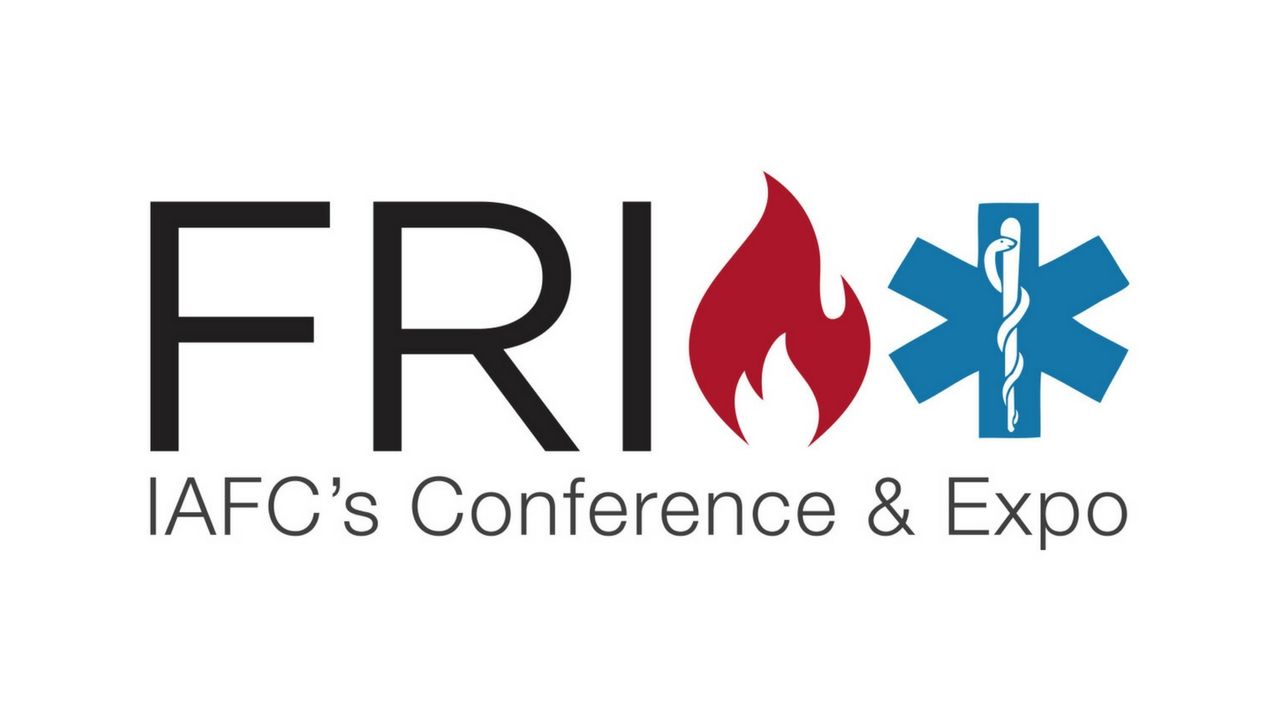
Each summer, thousands of the most prominent fire and emergency service leaders from across North America and around the globe come to Fire-Rescue International (FRI). This year, ProspectHR MMI is heading to Kansas City, Missouri at the Kansas City Convention Center, August 16 - 18, 2023. Helen Hale Tomasik, Certified Human Resources Leader and our Director of Business Development together with Karen Roche, Fire Chief for the City of Burlington will be speaking on the topic of “Creating an Inclusive Recruitment and Selection Process using the Multiple Mini Interview (MMI)”. This month we caught up with Helen and Karen for a Q+A discussion on what they are looking forward to and to get an overview of what their presentation will cover. Helen and Karen, we’re so glad to get some time with you! We know you’re busy preparing to travel to Kansas City next month for the Fire-Rescue International Conference and we'd love to get your thoughts on a few questions. Helen, what are you most looking forward to? Reconnecting with Fire Chiefs as I have not attended an in-person conference with Fire Services leadership since 2019 due to the COVID pandemic. Karen, what kinds of professionals will be in attendance at the conference? Fire Chiefs and Senior Officers in Fire Services from all over the world Helen, how did it come about that you are co-presenting with Karen Roche? Chief Roche has used the multi mini interviews (MMI) for a number of years and for the past 2 years she has used our virtual MMI to recruit and select firefighters. In fact City of Burlington was the first Fire Service in Canada to use our virtual platform. Karen asked me to join her to share the positive outcomes that can be achieved by using the MMI recruitment and selection process. Karen, what do you most want your audience to know or understand after attending the presentation? That the MMI is a very inclusive recruitment process that has enabled our Fire Service to hire people that are more open-minded, well-rounded, and have the human attributes that contribute to a holistic and welcoming environment. For me, the MMI process has highlighted the fact that hiring people who share common soft skill attributes can shift the culture of a fire service, one that celebrates the differences in a group of people who have different lifestyles, genders, racial backgrounds. The MMI has helped us become a more empathetic and compassionate service. Helen, have you been to Kansas City before? This will be my first visit. And Karen? I was there for an Emergency Medicine Conference in early 2000. Is there anything you’re looking forward to experiencing while you’re there? We are both looking forward to learning from other Fire Chiefs through attending the presentations as well as the networking that the FRI Conference provides. Thank you for your time Helen & Karen, we will catch up again with you before you leave for Kansas City and also keep everyone up to date on the happenings at the conference! For more information on the Fire-Rescue International event visit 2023fri.eventscribe.net/index.asp

Applicants to medical schools who reach the interview stage have already demonstrated their excellent knowledge of the medical sciences. However, that alone is not enough. Identifying the emotional and soft skill attributes that would make them successful medical students, and beyond that excellent physicians, is essential. In this short video Jack discusses how the ProspectHR MMI was developed to address these needs.
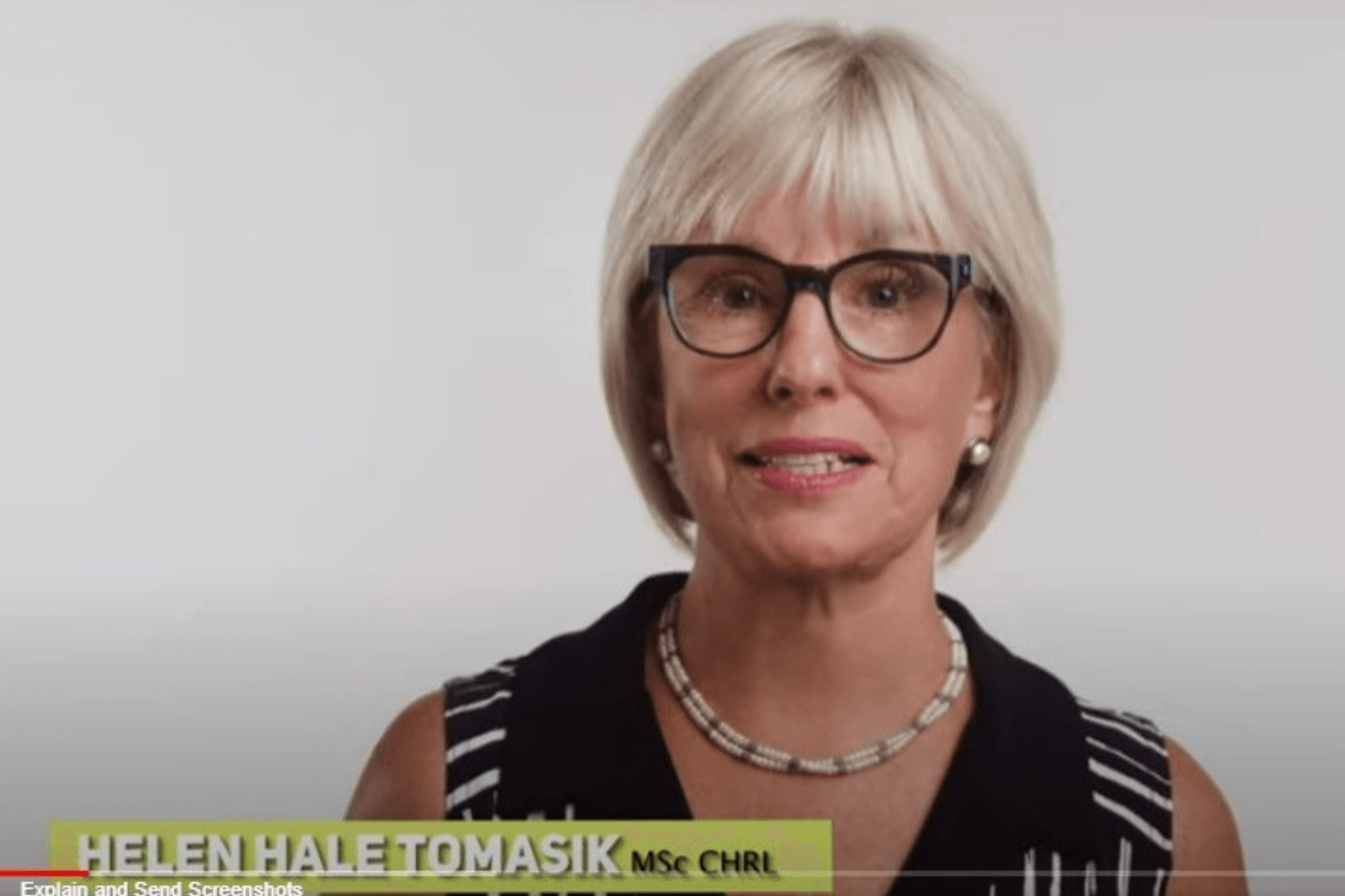
In this short video Helen discusses what she really likes about the Multipe Mini Interview including its versatility and the fact that the Prospect HR MMI can be used to assess all positions that require soft skills, from frontline positions, up to and including leadership roles. As an HR professional, Helen would be hard-pressed to identify any position in the private, public, or academic sector that does not require soft skills to be effective in their role.
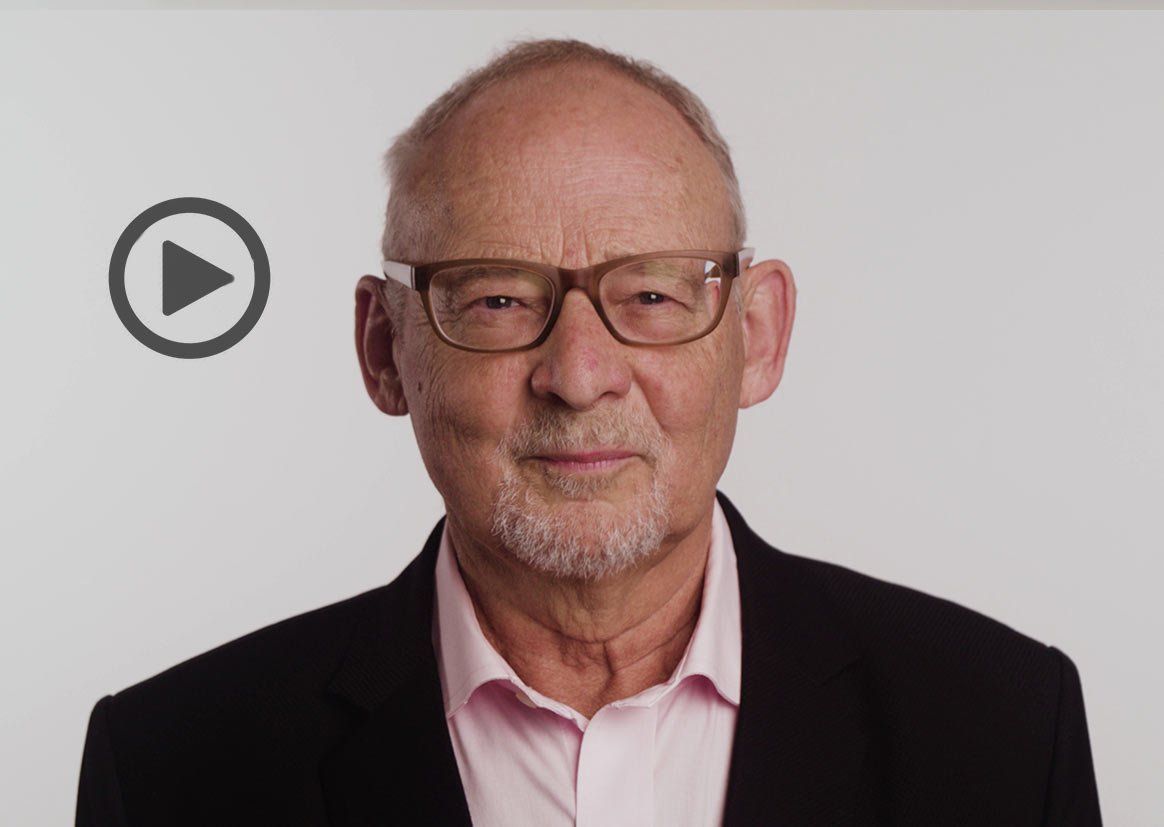
Peer-reviewed research over many years and many institutions has shown that the MMI is by far a better predictor of future performance, and is a proven method to significantly reduce bias in the interview process. One of the things most practitioners do not realize is that the Prospect HR MMI is very cost-effective when compared to the cost of a traditional three-person panel interview. In this short video Glen talks about how the savings are achieved in three areas.
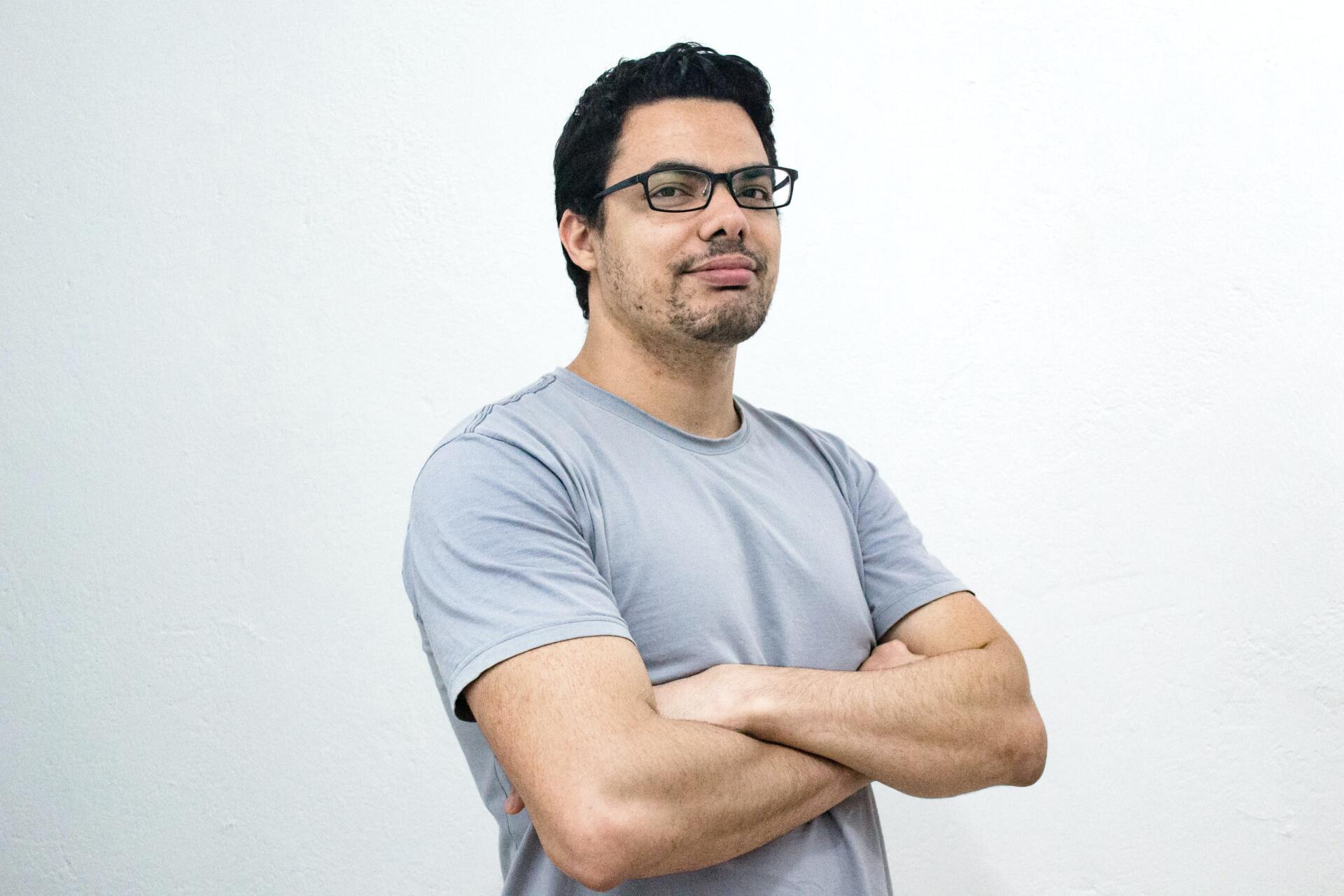
BMC Medical Education recently published the research document, "Are different station formats assessing different dimensions in multiple mini-interviews? Findings from the Canadian integrated French multiple mini-interviews" In its conclusions, it is stated, "The IFMMI assessed three dimensions that were related to stations formats, a finding that was consistent across two cohorts. This suggests that different station formats may be assessing different skills, and has implications for the choice of appropriate reliability metrics and the interpretation of scores. Further studies should try to characterize the underlying constructs associated with each station format and look for differential predictive validity according to these formats." According to Jack Rosenfeld, PhD and Professor Emeritus, McMaster University and Co-Founder and Chief Operations Officer of ProspectHR MMI, these conclusions supports ProspectHR MMI's commitment to offering an ever evolving library of stations that are professionally written and vetted. This library is unlike what other recruiting tools and companies offer and that gives clients a variety of stations to choose from, allowing them to target specific qualities or soft skills effectively and easily. ProspectHR MMI has purposely added unique functionality that allows clients to modify their selected stations to fit their unique needs. To read the research document please visit: https://bmcmededuc.biomedcentral.com/articles/10.1186/s12909-022-03681-4 Photo by Jonas Kakaroto on Unsplash

Photo by LinkedIn Sales Solutions on Unsplash In our recently published White Paper “Recruiting the Best: It’s not Who You Interview, It’s How” we relate how and why the MMI transitioned to a virtual environment. Here’s an excerpt: The pandemic has accelerated trends with respect to virtual remote working and virtual recruiting with both increased opportunity and increased challenges. Where historically HR professionals were recruiting locally or regionally, they are now finding talent nationally, and even globally, given the nature of remote working and its widespread acceptance among the workforce. Far from being an impediment, these models provide a competitive advantage. Given the demand for a virtual recruiting solution, ProspectHR MMI commenced development of a virtual solution for the MMI and successfully launched the virtual Multiple Mini Interview (vMMI) with two U.S. medical schools in the fall of 2020. The vMMI has all the advantages of the in-person MMI with the following additional benefits: Expands your candidate pool as there are no geographic or economic barriers to attend a vMMI. Recruiting outside of the local talent pool can provide access to higher-quality candidates and a more diverse workforce. Expands your selection of interviewers as they can interview from any location. Enables inclusion of diverse interviewers external to your organization, demonstrating commitment to diversity and inclusion.Reduces logistics and costs associated with in-person interviews. Enables business continuity when face-to-face interviewing is not possible. Provides enhanced confidentiality for leadership candidates and greater engagement of senior level interviewers when promoting internal talent or identifying high potentials for succession planning. Provides some insight into candidate facility and comfort with technology which may be important if relevant to position(s) being recruited for. While acknowledging the benefits of virtual interviewing, it is important to recognize that there are some disadvantages: Less opportunity for deciphering a candidate’s “body language”. Internet connectivity issues can sometimes be problematic. Potential for background disruption or distraction at the candidate’s end. • Less computer savvy candidates may be disinclined to participate (12) Overall, the advantages of virtual interviewing appear to outweigh the disadvantages, particularly when an organization needs to recruit a large number of positions in a short time frame, is not able to conduct in-person interviews, and needs to ensure confidentiality of their internal talent or external candidates for leadership positions. It is believed that a combination of traditional and virtual recruiting methods will be the “new normal”, in the same way that a hybrid workforce of onsite and remote employees has become more normalized during the pandemic paradigm (13). The ProspectHR virtual Multiple Mini Interview (vMMI) process, developed over the last few years, continues to evolve to provide a seamless process for those organizations who plan to go completely virtual in the future or maintain a hybrid model of recruiting. To read the full White Paper please visit https://www.prospecthrmmi.com/whitepaper

In our recently published White Paper “Recruiting the Best: It’s not Who You Interview, It’s How” we give an overview of who uses the MMI. Here’s an excerpt: ProspectHR MMI has made a successful transition into the world of employment. Public sector employers are embracing the MMI and have adopted this recruitment and selection system for a variety of reasons, including: The published scientific research in peer-reviewed journals provides evidence of reliable and valid outcomes in the selection of future health professionals. The assessment focuses on soft skills which are critical to organizational culture. The process removes interviewer influence on other interviewers, unlike panel interviews where there is typically one power-broker that influences the candidate score. Rater bias is significantly reduced when there are 8-10 independent raters scoring candidate performance, particularly when the interviewers are well trained and selected for their diversity. The process promotes diversity and inclusion as there is the ability to assess many more candidates from a much larger applicant pool, providing more opportunity for those with diverse backgrounds to excel and receive top scores. Because there are multiple independent scenarios, the applicant benefits when they have trouble with a particular scenario. They can recover with the next interviewer and a new mini-interview scenario. The system is a huge time saver in interview preparation for HR and operational leaders as there are more than 600 scenarios to select from. The ProspectHR MMI database covers a wide variety of current and topical issues from diversity and inclusion to leadership challenges. Scenarios are continuously reviewed, updated and added to. The organization can select the scenarios according to their corporate values as well as the soft skill competencies required of their employees. The system provides a very efficient way to interview a large number of applicants as documented with firefighter (10) and paramedic recruitment (10). Other positive outcomes reported include high quality candidates selected, improved workplace culture, and lower turnover of new hires (11). With a database of scenarios on people skills, soft skills and emotional intelligence, the ProspectHR MMI provides an excellent way to assess leadership character for internal promotion and succession planning processes. An entire corporate leadership team can be involved in the review of the up and coming talent across their organization through very brief MMI interactions with their high potential employees. This is an opportunity for high performing employees, who have leadership aspirations, to have face to face time with the most senior members of their organization. Not only is this process beneficial to engaging and retaining high potential employees, it offers a mechanism to determine which employees have the attributes to make them a worthwhile investment for leadership development. To read the full White Paper please visit https://www.prospecthrmmi.com/whitepaper

Photo by Towfiqu barbhuiya on Unsplash In our recently published White Paper “Recruiting the Best: It’s not Who You Interview, It’s How” we give an overview of how the MMI works. Here’s an excerpt: The Multiple Mini Interview (MMI) consists of a circuit in which 8-10 candidates cycle through 8-10 mini-interviews, each one with its own scenario and evaluator. Candidates have 1-2 minutes to read the interview scenario, then 5 to 8 minutes to discuss their responses with the evaluator. When their time to answer the scenario is over, they transition to the next mini-interview with a new evaluator, while their previous interviewer scores their performance. Their MMI is complete when they have responded to all of the scenarios in the circuit. The interview scenarios are designed to assess soft skills such as accountability, empathy, collaboration and teamwork, ethical and moral judgment, self-awareness, problem solving, resilience, communication skills and conflict resolution. The scenarios are written and vetted by subject matter/MMI experts and include probing questions, evaluation criteria, as well as the background and theory that supports the scenario. The candidate presents their opinion on the scenario and the interviewer has the tools to guide the interview and their assessment. To read the full White Paper please visit https://www.prospecthrmmi.com/whitepaper

Photo by Amy Hirschi on Unsplash The Multiple Mini Interview (MMI) was first developed by the Michael G. DeGroote School of Medicine at McMaster University in 2002 when it became clear that performance issues in the medical profession were not due to deficiencies in technical competencies but rather due to a lack of soft skills. The team developed and evaluated this innovative way to interview and recruit for skills in communication, teamwork, ethical decision-making, interpersonal relations, and professionalism. Between 2004 and 2008, the team published seminal papers describing the characteristics of the MMI. These attracted the interest of medical schools in Canada and the United States, which adopted the MMI as their interview technique. In 2012 the team published a follow-up study in the Journal of the American Medical Association, providing evidence that the MMI could predict performance on the medical licensing exams which took place 5 to 6 years after admission via the MMI (8). With this proof of effectiveness, the MMI became and continues to be widely used to evaluate applicants to medical schools in Canada, the United States, and Australia. Today the body of literature regarding the MMI consists of more than 180 publications from international authors in peer-reviewed scientific journals (9). The research confirms that the MMI is a reliable and valid soft skills assessment system that does not disadvantage applicants from under-represented minorities and improves the diversity of the candidates selected. In 2006 McMaster University licensed the MMI to ProspectHR MMI to commercialize the process and make it available to professions beyond medicine and beyond the admission process of academic institutions. ProspectHR MMI subsequently developed an online platform for the proven MMI to manage the planning, recruiting, interviewing and scoring for this talent acquisition process. The company also brought this innovation to the recruitment of students in other disciplines as well as to the hiring process for public and private sector employees. To read the full White Paper please visit https://www.prospecthrmmi.com/whitepaper

Photo by Brett Jordan on Unsplash In our recently published White Paper “Recruiting the Best: It’s not Who You Interview, It’s How” we outline the current talent management priorities. Here’s an excerpt: The challenges associated with effectively recruiting, selecting, and retaining talent are significant and will be a key focus for organizations in 2022 and beyond. A 2021 LinkedIn survey of 1500 talent acquisition specialists from 28 countries identified the top recruiting trends to be: virtual recruiting, shifting talent attraction efforts to remote candidates, more consideration of internal talent, and a focus on diversity, equity and inclusion (6). Surveys completed by McLean & Company in 2022 identified recruitment as the number one organizational HR priority with HR professionals reporting they expect to spend 25% more time on talent acquisition to meet the challenges posed in 2022 (7). The top talent management priorities identified by McLean & Company were in the following order: 1. Recruitment 2. Providing a great employee experience 3. Developing leaders The new paradigm brought on by the emergence of working from home and flexible working arrangements is requiring an enhanced, nimble, and nuanced response from HR departments. Job seekers accustomed to working remotely are now expecting faster interview timelines and streamlined hiring processes. To date, organizations are reporting challenges in this area. In 2021, only 44% of organizations felt they were able to recruit effectively, and only 38% of employers reported having a documented strategy for accomplishing their recruitment needs. Reports also indicate that HR professionals are experiencing more significant levels of stress as compared to recent years with 60% of HR professionals expecting to experience higher stress in 2022 (7). It becomes evident that an up-to-date talent acquisition strategy that addresses the recruiting trends shaped by the pandemic and embraces the benefits of virtual technology is more critical than ever in 2022. To read the full White Paper please visit https://www.prospecthrmmi.com/whitepaper

Photo by Andre Hunter on Unsplash In our recently published White Paper “Recruiting the Best: It’s not Who You Interview, It’s How” we outline the true costs of hiring the wrong candidate. Here’s an excerpt: Recruiting and hiring the right person is one of the most difficult and important tasks an organization undertakes. In a recent survey more than three out of four senior managers admitted that they recruited the wrong candidate for a role and that it took 11 weeks on average before they realized the poor fit (1). A survey by CareerBuilder in Canada found that a bad hire wastes 27 weeks of an organization’s time, including an average of 7 weeks to hire a replacement (2). The negative consequences of a bad hire include the cost in wasted time recruiting, onboarding and training, decreased staff morale and productivity, and increased stress on supervisory staff. The cost of hiring the wrong person is estimated to be 1.5 to 3.5 times their annual salary (3). Avoiding the wrong hire requires assessment of an applicant’s soft skills including attributes such as ethical acumen, accountability, empathy, resilience, team work and collaboration. Determining the soft skill attributes of potential candidates for front line positions up to leadership roles is essential to organizational performance in all workplaces, especially as organizations evolve with technology. However, soft skills are more challenging to assess than technical and cognitive skills. Compounding the recruitment challenge is the increasing rate of voluntary turnover and early retirement that has been accelerated with the Pandemic. This has put pressure on organizations to ensure that they have the labour resources to remain viable and to compete. While Canada has not experienced the “Great Resignation” wave to the extent that the United States did in 2021, Canadian employers need to be prepared for a resignation wave in 2022. A Bank of Canada survey in January 2022 indicated that 19.3% of workers expect to quit their current job in the next 12 months (4). To read the full White Paper and references, please visit https://www.prospecthrmmi.com/whitepaper

In this month's Let's Talk video, we're once again focused on ProspectHR MMI board members and why they believe in ProspectHR MMI. In this video Craig Wood, ProspectHR MMI CEO discusses a few key questions that give viewers an understanding of why he joined the team and why he believes in ProspectHR MMI as an assessment tool. For more information about the benefits of ProspectHR MMIi visit this page , or email our team at info@prospecthrmmi.com .
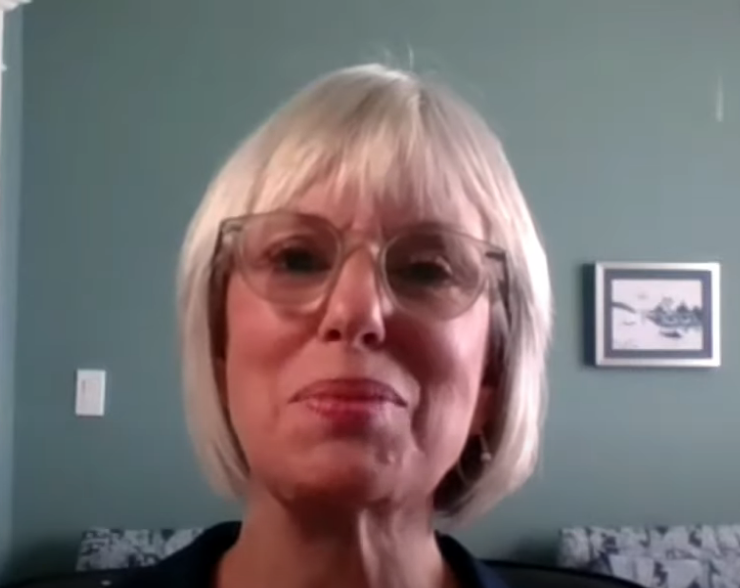
In this month's Let's Talk video, Helen Hale Tomasik MSc, CHRL, Director of Business Development talks about why she believes in, and works with ProspectHR MMI. Helen walks us through these three questions in this informative and engaging video: Why did you become involved with ProspectHR MMI? What benefits have you seen when organizations use ProspectHR MMI to select candidates? What’s the best part of working with ProspectHR MMI? For more information about the benefits of ProspectHR MMIi visit this page , or email our team at info@prospecthrmmi.com .

Successful organizations have a future-focused talent strategy that develops and sustains a leadership pipeline. Assessing for leadership potential helps an organization predict who is most likely to be effective in more senior roles and identifies where investments in leadership development would be most worthwhile. Assessing for leadership potential also communicates to employees, who are interested in advancing their career, that you are interested in retaining and developing talent within your organization. What should be assessed? Too often employees are promoted based upon their performance in their current roles. Being a high performer in a current role does not necessarily predict performance in a leadership role where one needs to achieve results through their people. The Pandemic has accelerated the need for a new kind of leader – one who is agile, is a continuous learner, likes to collaborate, and has the Emotional Intelligence to manage their own emotions while guiding others through chaos and uncertainty. Frankly, all these attributes have always been important when considering whether a high performing employee has the potential to take on more complex responsibilities and ambiguous roles in the future. There are a variety of models for assessment of leadership potential which typically include measures of competencies, cognitive ability, and personality. In my HR practice I favoured the Learning Agility approach to leadership potential which included assessment for: People Agility – people who are acutely self-aware, emotionally intelligent, treat others well, welcome feedback, and are resilient when the going gets tough Results Agility – people who get results under pressure and inspire others to do the same Mental Agility – people who are comfortable with complexity and ambiguity, can think through complex problems and explain their thinking to others Change Agility – people who are curious, open to change and able to champion new approaches, and are always developing themselves These agilities in combination with a direct supervisor’s assessment of the candidate’s current competencies and results track record (from performance reviews), and their commitment to the hard work of leadership, laid the foundation for high potential assessment. The final step was a multi-interviewer assessment of their soft skills, traits and values that were critical to achieving our corporate culture. How should Leadership Potential be assessed? First and foremost, the assessment process needs to be transparent and well communicated. Your organization must communicate why you are assessing for high potential, what it takes to be an effective leader in your organization, and how those who are interested in advancing their career to leadership roles will be assessed. Finally, how will feedback from the process be provided to those who step forward. Secondly, to achieve a comprehensive assessment, multiple assessment methods and tools should be reviewed. Select those which have been professionally researched and evaluated. Thirdly, to avoid evaluation bias of individuals who are closest to the candidates, I would strongly encourage engaging multiple perspectives from a cross section of leaders in your organization. The Multiple Mini Interview (MMI) is an excellent method to determine whether the candidates have the necessary leadership character and people skills to achieve a high performing and inclusive organization through the trust and respect of their people. The MMI provides a quick and efficient way for senior leaders to develop ownership of the talent across the organization. They get a firsthand look at the upcoming talent, and employees appreciate the one-on-one face time with senior leadership. The MMI also offers a great way to enrich the dialogue at your talent assessment meetings when you are determining who will be considered for stretch assignments and leadership development. Assessing for leadership potential is a critical first step in the development of a leadership pipeline. Contact me at Helen.Tomasik@Prospecthrmmi.com if you are interested in learning more about how the MMI can help you determine who has the necessary attributes to take on higher level leadership roles in your ‘future ready” organization. View the companion Let's Talk Video on this topic: https://www.prospecthrmmi.com/video-assessing-for-leadership-potential

